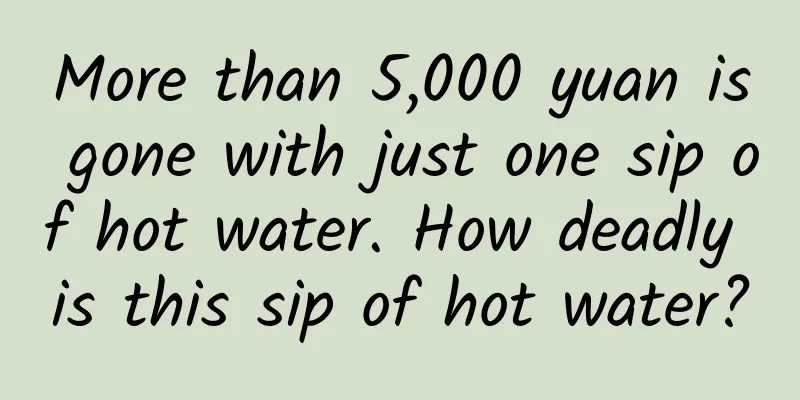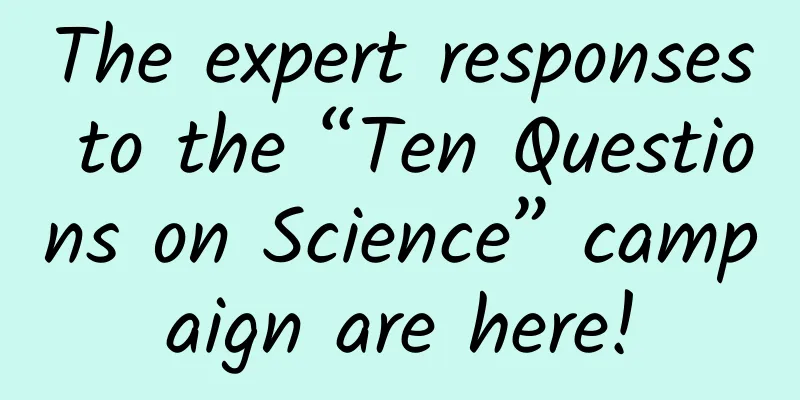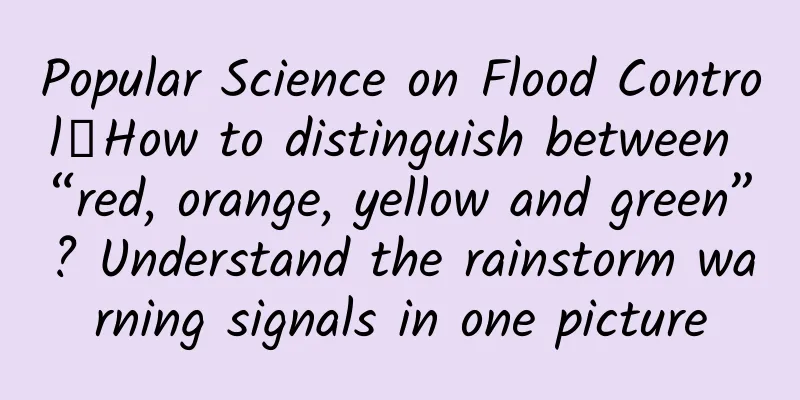More than 5,000 yuan is gone with just one sip of hot water. How deadly is this sip of hot water?

|
recently A netizen was in a hurry to go out Drinking hot water in one gulp can cause tongue burns The surgery cost more than 5,000 yuan after reimbursement Arousing heated discussion "Drink more hot water" is a catchphrase for many people, but some of you may not know that hot drinks above 65°C are included in the Class 2A carcinogen list. The normal temperature tolerance of the esophageal mucosa is 40℃~50℃. If it exceeds 65℃, it may cause damage, ulceration and other problems. Today we will study: What harm can over-scalding water cause? What should I do if I get burned accidentally? How to protect the esophagus in daily life? Water temperature that is too high is harmful Drinking hot water is beneficial to your health to a certain extent, but some people like to drink boiling hot water, hot soup, hot tea, etc. This is not a good habit and may harm your health. The temperature of the human mouth and esophagus is mostly between 36.5 and 37.2°C. The most suitable temperature for eating is between 10 and 40°C, and the highest tolerable temperature is between 50 and 60°C . If the temperature of hot water is around 70-80℃, it is easy to burn the esophagus when drinking it, causing damage to the esophageal mucosa. If you often drink overheated water, it will cause repeated damage to the esophagus, thereby increasing the risk of esophageal cancer. The International Agency for Research on Cancer (IARC), an agency of the World Health Organization, issued a report warning that drinking hot drinks above 65°C may increase the risk of esophageal cancer . A research report published in the International Journal of Cancer also suggests that drinking tea at too high a temperature can significantly increase the risk of esophageal cancer. Compared with those who hardly drink tea or prefer herbal tea, people who drink more than two cups of tea at 60 degrees Celsius a day have a 90% higher risk of developing esophageal cancer. It should also be noted that the hot drinks mentioned here are not just beverages and tea above 65°C, but also include all solid foods , that is, all foods that can be eaten by us, such as our favorite hot pot, malatang, hot dumplings, etc. However, there is no need to be too anxious. Hot drinks above 65°C may cause cancer. It does not mean that you cannot drink hot coffee, hot milk tea, or hot water. The relationship between hot drinks and esophageal cancer cannot be simply summarized as "drinking hot water causes cancer." The so-called Class 2A carcinogens mean that these substances are likely to cause cancer. Currently, some credible evidence of their carcinogenicity can be provided, but the evidence is still limited and needs further supplementation. As for how much hot food you need to eat to cause cancer, there is no clear quantitative information. Not eating hot food does not necessarily mean you will not get esophageal cancer, because there are many other factors that can cause a person to get cancer. But what is certain is that eating less hot food and drinking less hot water can definitely reduce the risk of esophageal cancer . What to do if you get burned If you accidentally drink hot water that burns your esophagus, you should do the following: • Drink cool liquids to reduce body temperature immediately , such as boiled water, tap water, or room temperature beverages; • Do not drink ice water to avoid further damage to the esophageal mucosa and gastric mucosa. • If you feel discomfort in your esophagus at night, you can take medication to protect the esophageal and gastric mucosa . • Generally speaking, mucous membranes recover quickly . As long as the liquid is not corrosive, it should recover in one or two days. If the symptoms still cannot be relieved after two days, you should go to the hospital immediately . Protect your esophagus Our esophagus is very fragile, but because the esophagus is insensitive to temperature, sometimes we don’t know that the esophagus has been burned. If the esophagus is burned repeatedly for a long time, it will lead to more and more atypical cells and eventually develop into cancer. To protect the esophagus, we must start with our daily diet and reduce the occurrence of esophageal mucosal damage and inflammation from the "entrance". 1. The temperature of food should be appropriate The esophageal mucosa is relatively tender, and the suitable food temperature is between 10℃ and 40℃, while the highest temperature that people can tolerate is between 50℃ and 60℃. If the temperature exceeds this, the esophageal mucosa will easily be burned. 2. Try to eat less high-salt foods, drink less alcohol and strong tea Pickled high-salt foods, high-concentration alcohol, strong tea and other irritating foods or drinks can also erode or irritate our esophageal mucosa, causing damage to the esophageal mucosa. If things go on like this for a long time, they may induce chronic inflammation and esophageal mucosal cancer. 3. Don’t always eat hard food Eating hard food will increase the friction between food and the esophageal mucosa, causing mechanical damage to the esophageal mucosa, especially the mucosa in the narrow part of the esophagus. 4. Chew your food thoroughly Eating too fast means that the food is not fully chewed in the mouth and cannot be fully mixed with saliva. This rough, poorly lubricated food is likely to cause damage to the esophageal mucosa. The "Dietary Guidelines for Chinese Residents (2016)" recommends spending 15 to 20 minutes eating breakfast, and about 30 minutes for lunch and dinner . It is recommended that the general public chew each mouthful of food about 20 times. People with poor stomachs and the elderly should chew each mouthful of food more than 25 times. 5. Regular screening Esophageal cancer is very hidden in its early stages, so people at high risk should be screened in a timely manner. So who are the people at high risk of esophageal cancer? The "Recommendations for Screening and Prevention of Common Malignant Tumors in Residents" issued by the Shanghai Anti-Cancer Association in 2019 pointed out that people aged >40 years who meet any of the following risk factors are considered high-risk groups: • Come from a high-incidence area of esophageal cancer in China (the most concentrated area of esophageal cancer in China is located on the south side of Taihang Mountain at the junction of Hebei, Henan and Shanxi provinces, especially in Ci County. There are also relatively concentrated high-incidence areas in Qinling Mountains, Dabie Mountains, northern Sichuan, Fujian and Guangdong, northern Jiangsu, Xinjiang and other places); • Upper gastrointestinal symptoms , such as nausea, vomiting, abdominal pain, acid reflux, discomfort with eating, etc.; • Family history of esophageal cancer ; • Suffering from esophageal precancerous diseases or precancerous lesions ; • Have high risk factors for esophageal cancer such as smoking, heavy drinking, head and neck or respiratory tract squamous cell carcinoma, etc. The "Recommendations for Screening and Prevention of Common Malignant Tumors among Residents" issued by the Shanghai Anti-Cancer Association in 2019 provides specific screening recommendations for esophageal cancer: • Routine endoscopy for people at high risk of esophageal cancer, once every 2 years; • Endoscopic examination pathology suggests mild dysplasia, and endoscopy is performed once a year; • Endoscopic pathology showed moderate dysplasia, and endoscopic examination was performed every six months . |
>>: With the birth of semi-artificial life, how far are we from becoming "God"?
Recommend
Farewell to Academician Li Deping: He spent his life building a radiation protection wall for China
On the evening of March 16, the China Institute o...
Will not brushing teeth for a long time cause pneumonia? Periodontitis is related to so many systemic diseases...
Periodontitis is the most common oral disease, so...
“Zombie deer disease” may be transmitted to humans. How should we deal with it?
"Zombie deer disease" has appeared in t...
Creative strategies for placing wedding photography information flow ads!
As my country's economy is performing well ov...
Apple iOS/iPadOS 15.1 official version released: support for AirPods 3, sharing and broadcasting, and a series of improvements
[[431039]] On October 26, according to contributi...
Check out 8 basic Facebook advertising tips!
For marketers and businesses, advertising on Face...
Drinking can prevent frostbite and warm the body? Don’t believe these 6 drinking rumors!
When eating, you can't help but drink a few g...
US official: Tesla battery reignites twice after fatal crash
The battery of a Tesla Model S reignited twice af...
About the arrangement of reminder methods in APP
I have sorted out the usage of various pop-up win...
Xiaozu·2022 Doudian no-source store group new gameplay summary and small store free store technology
Xiaozu·A summary of new gameplay of Doudian's...
The graceful water scenery in the desert, how beautiful are the lakes in Xinjiang?
Your browser does not support the video tag Lakes...
Android Wear is also about to be upgraded to 5.0, and the watch face display mode is turned on
In this era of personalization, you may also thin...
Let foodies deal with invasive species, this country has done it
= "Let foodies solve the problem of invasive...
How much do you know about these five little-known facts about durian?
Five little-known facts about durian 1. The first...
How do new domestic brands conduct offline marketing?
"If you are good at online business, then go...




![Operate the local delivery ordering group project, zero threshold operation, simple and fast monetization [Video Course]](/upload/images/67cc30221a0d9.webp)




